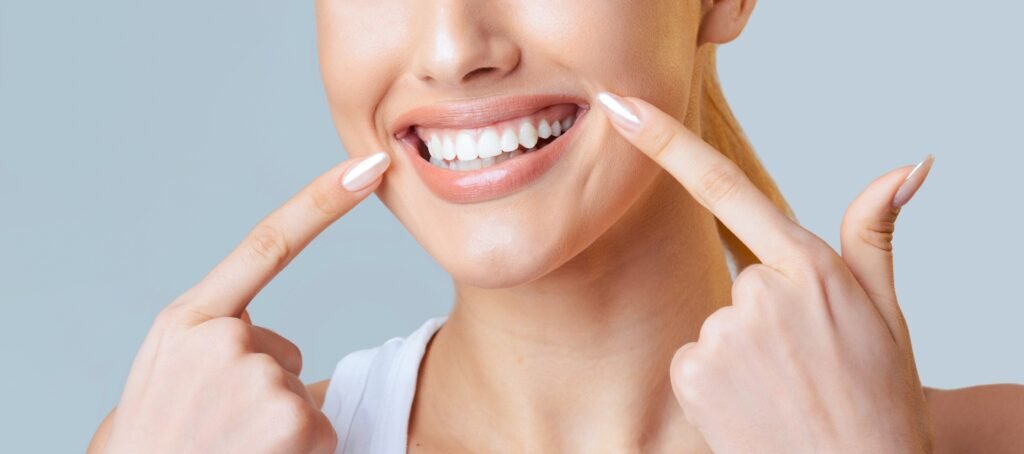Dreaming of a dazzling, brighter smile? You’re not alone! Many consider teeth whitening to enhance their appearance, and with countless at-home teeth whitening products flooding the market, it’s easy to get lost in conflicting information and misconceptions.
At Smiles by Eddie, we believe in empowering you with accurate information to make the best decisions for your oral health and smile. Let’s debunk some of the most common at-home teeth whitening myths that might be holding you back from achieving the pearly whites you desire.
Myth #1: Teeth Whitening Causes Permanent Sensitivity
One of the biggest concerns we hear is that teeth whitening will lead to lasting tooth sensitivity. While it’s true that some individuals might experience temporary sensitivity during or immediately after a whitening treatment, it’s rarely permanent.
If you experience any sensitivity, it’s usually temporary and should go away within a few days. The best way to avoid sensitivity is often to use a desensitizing toothpaste or rinse before and after whitening your teeth. Professional guidance, like the kind you receive at Smiles by Eddie, can help minimize this by adjusting the treatment plan to ensure your comfort.
Myth #2: Teeth Whitening is Too Expensive
Many people believe that achieving a whiter smile comes with a hefty price tag. While professional in-office whitening offers the most dramatic and safest results, there are various options available across different price points. At-home teeth whitening kits can be found for as little as $20, and professional procedures start at around $100.
However, professional whitening offers more noticeable, longer-lasting results and includes expert oversight, while at-home kits are cheaper upfront but may require repeat use and show modest improvement over weeks. At Smiles by Eddie, we can discuss various whitening solutions, including professional-grade at-home options and in-office treatments, to fit your budget while prioritizing your dental health and achieving noticeable results.
Myth #3: Any Product Labeled “Whitening” Will Work Effectively
The dental aisle is full of toothpastes, rinses, and strips claiming to whiten your teeth. However, many products advertised as “whitening” are “nothing more than glorified toothpastes” and won’t give you the dramatic results you hope for.
In-office treatments use stronger agents for immediate results, while at-home kits contain lower concentrations of peroxide (or alternative agents like baking soda) and take longer to show visible results. For truly effective and safe whitening, you need products with sufficient concentrations of active ingredients. Your dentist can recommend professional-grade take-home kits that are significantly more potent and effective than most store-bought alternatives, ensuring you get the results you’re hoping for.
Myth #4: You Don’t Need to Follow Instructions for At-Home Whitening Products
This myth can lead to significant problems! If you don’t follow the directions on teeth whitening products, you could end up causing damage to your teeth and gums.
At-home methods can lead to gum irritation and enamel wear if overused. Always make sure to read the instructions thoroughly before using any kind of teeth whitening product. Better yet, consult with us at Smiles by Eddie for personalized advice and professional-grade kits that come with clear, easy-to-follow guidance. This is one of the most crucial at-home teeth whitening myths to understand.

(Using an at-home teeth whitening kit requires careful attention to instructions to ensure safe and effective results)
Myth #5: Teeth Whitening Only Works on Natural Teeth
It’s a common misconception that teeth whitening is only effective on natural tooth enamel. Teeth whitening does not only work on natural teeth and can be an effective way to improve the appearance of both natural and artificial teeth.
However, it’s important to understand that crowns, veneers, fillings, and bonding materials do not whiten in the same way natural teeth do. This means that after whitening, your natural teeth may become lighter, potentially creating a color mismatch with existing dental work. If you have restorations, discuss your whitening goals with us at Smiles by Eddie. We can help you understand the expected outcomes and explore options to achieve a uniformly bright smile. Don’t fall for this at-home teeth whitening myth!
Comparing Whitening Options
Here’s a quick look at the differences between professional and at-home whitening methods, helping you navigate the various at-home teeth whitening myths:
| Feature | Professional In-Office Whitening | Professional At-Home Kits (from dentist) | Over-the-Counter At-Home Kits |
| Effectiveness | Most dramatic, immediate results | Very effective, gradual results | Modest, gradual results |
| Speed | Fastest results (1-2 visits) | Weeks for full results | Weeks to months for modest results |
| Safety | Safest (dentist oversight) | Very safe (dentist supervision) | Riskier if not used correctly |
| Cost | Higher upfront cost | Moderate cost | Lower upfront cost |
| Supervision | Full dental supervision | Dental supervision and custom trays | No dental supervision |
| Sensitivity | Managed by dentist | Managed with desensitizing products | Possible, less guidance |
Understanding Whitening Agents
The primary active ingredients in most teeth whitening products are peroxides.
| Whitening Agent | Concentration (Typical) | How it Works | Notes |
| Hydrogen Peroxide | 6%-40% | Releases oxygen molecules that break down stains | Faster-acting, often used in in-office treatments |
| Carbamide Peroxide | 10%-35% | Breaks down into hydrogen peroxide and urea | Slower-acting, commonly used in at-home trays and gels |
| Other Agents | N/A | Abrasives, baking soda, blue covarine | Less effective at true bleaching; remove surface stains only |
Frequently Asked Questions About Teeth Whitening
The longevity of teeth whitening results varies depending on the method used, your diet, and oral hygiene habits. Professional whitening can last anywhere from six months to two years, while at-home results may require more frequent touch-ups.
While generally safe for most, teeth whitening might not be suitable for individuals with certain conditions like gum disease, highly sensitive teeth, or significant dental work. Always consult with a dentist before starting any whitening treatment.
As mentioned, existing dental restorations like veneers, crowns, and fillings do not whiten. If you have these, your natural teeth may become lighter, creating a color difference. Discuss your options with your dentist for a uniform smile.
The frequency of whitening depends on the method and product. Over-whitening can lead to sensitivity and enamel damage. Your dentist can provide a personalized recommendation based on your oral health and desired results.
Teeth can become discolored due to a variety of factors, including aging, consumption of staining foods and drinks (like coffee, tea, red wine, and berries), tobacco use, certain medications, and poor oral hygiene.
When used correctly and under professional guidance, teeth whitening is safe and does not damage enamel. However, misuse or overuse of at-home products can lead to temporary enamel roughening or sensitivity.
“Bleaching” typically refers to whitening teeth beyond their natural shade, usually with peroxide-based products. “Whitening” can refer to restoring a tooth’s natural color by removing surface stains, which can be achieved with abrasive toothpastes.
It’s generally recommended to whiten your teeth before getting new dental work if you’re aiming for a brighter smile. This allows your dentist to match the new restoration to your newly whitened teeth, ensuring a seamless appearance.
Immediately after a whitening treatment, your teeth can be more susceptible to staining. It’s advisable to avoid highly pigmented foods and drinks (like coffee, tea, red wine, dark sodas, berries) for at least 24-48 hours.
Professional teeth whitening offers stronger, more effective whitening agents, customized trays for even results, and expert oversight to minimize sensitivity and ensure the safety of your teeth and gums. While store-bought kits are cheaper, they often provide less dramatic and less consistent results.
Achieve Your Brightest Smile with Confidence
Navigating the world of teeth whitening can be confusing with so many at-home teeth whitening myths circulating. The key takeaway is that safe, effective, and lasting results are best achieved with professional guidance. Whether you’re considering in-office treatment or a professional-grade at-home kit, consulting with a dental professional ensures your unique needs are met and your oral health remains a top priority.
Don’t let misinformation keep you from achieving the radiant smile you deserve. At Smiles by Eddie, we’re dedicated to helping you find the perfect whitening solution.
Ready for a healthier, brighter smile? Learn more about Dr. Eddie A. Ahdoot and our commitment to your dental health, or browse our Smile Gallery to see before and after transformations.
Contact us today at Smiles by Eddie to schedule your consultation and take the first step towards a confident, dazzling smile! You can also easily book your appointment online.

